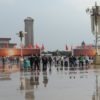Chen*, a 33-year-old mainland Chinese student in Toronto, recently wrote an article for one of Canada’s largest newspapers where he criticized both China and Western countries’ handling of the coronavirus outbreak. While he expected some pushback, Chen was surprised to discover where much of the vitriol came from.
“A lot of really nasty comments came from Asian [Canadians],” Chen said. “[They said] things like, ‘Go back to China,’ or ‘Why did you write this propaganda piece?’” He added, “If you’re just attacking me because of my identity, I don’t think that’s something that I can accept.”
Amid the COVID-19 pandemic where Sinophobic rhetoric is already on the rise, the blowback Chen received signals a climate of increased geopolitical polarization, making it extremely difficult to have open political discussions about China. As Chen said, “[T]he biggest problem we’re facing today… is that people oftentimes talk past each other.”
Chinese international students want to have their political agency respected.
Chen moved to Canada for a master’s degree in one of the most well-respected international affairs programs in the country. Before moving, he worked in Beijing at various English-language media bureaus.
Chen’s background between these two countries gave his piece a unique angle that was equally disapproving of Chinese and Western responses to the coronavirus. It criticized the lack of urgency that some Western leaders displayed in the face of the pandemic, such as in the US and Italy. It also criticized the Chinese Communist Party for reprimanding Dr. Li Wenliang, the late mainland doctor who first tried to sound the alarm about the virus.
“I didn’t let China off the hook at all,” he insists. “[People] assume I’m brainwashed, super uber rich, or a spy.”
These broad identity-based attacks that Chinese international students in the West face have the potential to incite defensive reactions, smother nuanced discussions, and pressure students to choose between competing nationalisms. Yet many of these students are fighting to develop their own personal and unique political perspectives. Chinese international students want to have their political agency respected, including having the space to offer nuanced analysis across different regions and contexts. “Something that I didn’t realize before [coming to Canada] was that when it comes to China, not everything has to be black and white,” Chen said.
Lizzie*, 24, and Karen*, 23, are both Chinese international students studying law at a university in Canada. Like Chen, they say the pandemic has cemented their feeling as outsiders in Canada. In their case, however, the pandemic also left them with the feeling that the Chinese government didn’t care about them.
As the pandemic comes under control in China while spreading widely in the West, Lizzie and Karen noticed that Chinese social media critics adopted the term “pao du” (跑毒) to describe Chinese international students who want to go back to China, a now relatively “safe” place.
‘This is the first time I clearly realized that I do not belong here. We feel like we’re being rejected in multiple ways.’
“Our home country didn’t want us to go back,” Karen said. “The Chinese media basically made international students… enemies.” To her, Chinese international students have been dehumanized by state media discourse rather than being viewed ”as someone’s child [or] family member who needs to be back with their families.”
To make matters worse, Lizzie and Karen were even briefly threatened by their university with eviction from their student residences when panic over the virus began to mount, with no guidance for students about alternative living arrangements. Though they eventually were granted exemptions due to border restrictions, their feelings of exclusion in Canada during the pandemic were particularly acute.
“This is the first time I clearly realized that I do not belong here,” Lizzie said. Karen agreed. “We feel like we’re being rejected in multiple ways.”
Thinking back to when she was weighing the decision to pursue a law degree abroad, Lizzie remembers telling her mom “It’s a free world. I can go back home every summer… I can be a global citizen. I can [live] half of the year in Toronto and half of the year in China.”
”[But] after this, it’s just like, globalization is a joke,” she added.
Various governments, including the US and China, have invoked nationalism to point fingers at one another and competed to control the narrative of the pandemic. Pundits and armchair detectives alike have pushed their own conspiracy theories of where the coronavirus originated, be it a lab in China or American athletes visiting China during the Military World Games last year. US President Donald Trump has even labelled COVID-19 the “Chinese virus.”
This type of fear-mongering has translated to concrete xenophobic policies targeting Chinese students. As the 2020 US presidential election looms, Donald Trump has barred Chinese international students who have worked for or studied at any Chinese state-adjacent entity by limiting student visas for graduate or postgraduate study. Such students, according to the US government, are part of China’s “military-civil fusion strategy.” Even journalists have fallen prey to this tit-for-tat battle between the two superpowers. Last month, a new visa limitation was placed on Chinese journalists working in the US for non-US media firms. This would affect countless US-based Chinese journalists and make their employment increasingly precarious.
Canadian media have also escalated nationalistic rhetoric for domestic political gain by painting the large and heterogenous Chinese-Canadian population as implicated in the Chinese government’s United Front Work Department. Certain Canadian outlets have alleged that Chinese-Canadians contributed to China cornering the global market on masks and personal protective equipment in its response to the coronavirus outbreak in January and February of this year, which is just one example of how the discourse around the virus has contributed to a massive increase in anti-Asian racism. Vancouver alone has seen a 600% increase in reported hate crimes targeting Asian communities.
As the media and politicians alike double down on nationalist scapegoating to draw attention away from domestic struggles, the conflation of Chinese students—even East Asians living in North America or others who may look Chinese—with the Chinese state apparatus has intensified.
Today, Chen disapproves of couching media coverage in highly political terms because it traps individuals like himself between a rock and a hard place. “I feel like I’m a double dissident now in [Canada], my adopted home,” he said.
Amid a torrent of highly critical news coverage of China in Canada, Chen remembers feeling refreshed when, discussing a particular trade dispute, his international trade professor defended China in class, stating that the dispute was not necessarily China’s fault. That small gesture was significant for Chen. “Sometimes it helps to ask the question, ‘What has China done right?’” he said. “That was not the kind of question I would ask as a journalist [in China.]”
For Lizzie, navigating between political censorship in China and Sinophobia in the West has been a learning experience. Even as she faces Chinese state censorship for speaking out on Weibo about the mishandling of the pandemic, Lizzie says that she at least feels heard and understood in the Chinese digital sphere. In China, Lizzie explained that she thinks people understand the political context and care about the humanity and struggles of people affected in Wuhan and the surrounding area. At the same time, in Canada, her concerns about the virus during the early months of 2020, as well as the tragedy of the death of Dr. Li Wenliang, seemed to fall on deaf ears. This contradiction is not lost on her.
“In China, my voice gets heard but it also gets deleted. [There], my parents, my teachers, and my professors told me that you need to be careful… with what you express when you post,” she said. However, in Canada, Lizzie remarked, “I can say everything… I have all the freedom, but not many people care about what I say.”
*Last names removed to protect the identity of the sources






